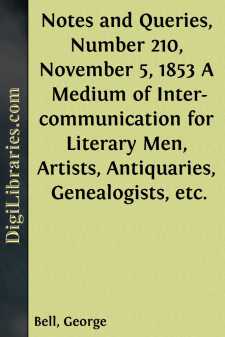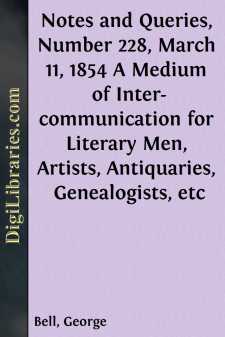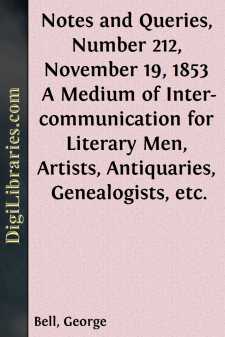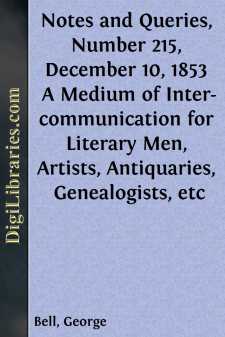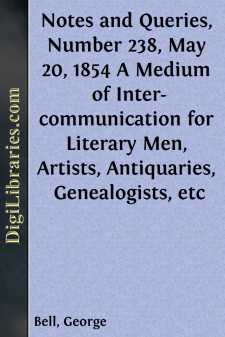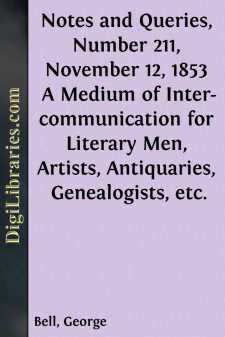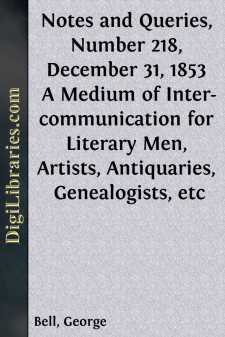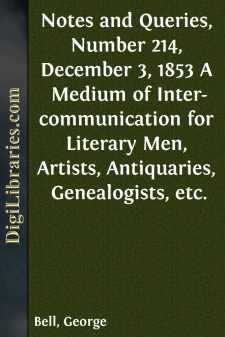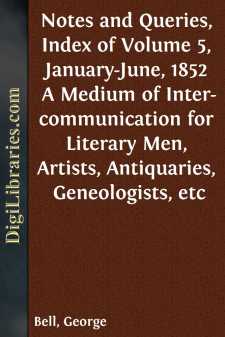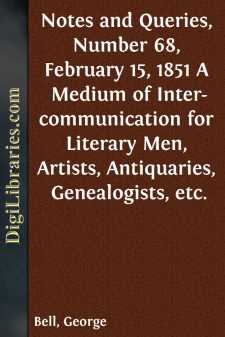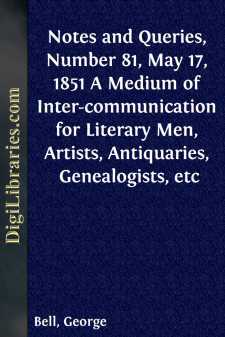Categories
- Antiques & Collectibles 13
- Architecture 36
- Art 48
- Bibles 22
- Biography & Autobiography 813
- Body, Mind & Spirit 142
- Business & Economics 28
- Children's Books 17
- Children's Fiction 14
- Computers 4
- Cooking 94
- Crafts & Hobbies 4
- Drama 346
- Education 46
- Family & Relationships 57
- Fiction 11829
- Games 19
- Gardening 17
- Health & Fitness 34
- History 1377
- House & Home 1
- Humor 147
- Juvenile Fiction 1873
- Juvenile Nonfiction 202
- Language Arts & Disciplines 88
- Law 16
- Literary Collections 686
- Literary Criticism 179
- Mathematics 13
- Medical 41
- Music 40
- Nature 179
- Non-Classifiable 1768
- Performing Arts 7
- Periodicals 1453
- Philosophy 64
- Photography 2
- Poetry 896
- Political Science 203
- Psychology 42
- Reference 154
- Religion 513
- Science 126
- Self-Help 84
- Social Science 81
- Sports & Recreation 34
- Study Aids 3
- Technology & Engineering 59
- Transportation 23
- Travel 463
- True Crime 29
Notes and Queries, Number 210, November 5, 1853 A Medium of Inter-communication for Literary Men, Artists, Antiquaries, Genealogists, etc.
by: George Bell
Categories:
Description:
Excerpt
LORD HALIFAX AND MRS. CATHERINE BARTON.
Those who have written on the life of Newton have touched with the utmost reserve upon the connexion which existed between his half-niece Catherine Barton, and his friend Charles Montague, who died Earl of Halifax. They seem as if they were afraid that, by going fairly into the matter, they should find something they would rather not tell. The consequence is, that when a writer at home or abroad, Voltaire or another, hints with a sneer that a pretty niece had more to do with Newton's appointment to the Mint than the theory of gravitation, those who would like to know as much as can be known of the whole truth find nothing in any attainable biography except either total silence or a very awkward and hesitating account of half something.
On looking again into the matter, the juxtaposition of all the circumstances induced in my mind a strong suspicion that Mrs. C. Barton was privately married to Lord Halifax, probably before his elevation to the peerage, and that the marriage was no very great secret among their friends. As yet I can but say that the hypothesis of a private marriage is, to me, the most probable of those among which a choice must be made: farther information may be obtained by publication of the case in "N. & Q.," the most appropriate place of deposit for the provisional result of unfinished inquiries.
Charles Montague (born April, 1661, died May 19, 1715) made acquaintance with Newton when both were at Trinity College in 1680 and 1681. Newton was nineteen years older than Montague, and had been twelve years Lucasian professor. At the beginning of their friendship, the Lucasian professor must be called the patron of the young undergraduate, who was looking for a fellowship with the intention of taking orders, a design which he did not find sufficient encouragement to abandon until after he had sat in the Convention. By 1690, the rising politician had become the patron of the author of the Principia, who in that year or the next became an aspirant for public employment. The friendship of Newton and Montague lasted until the death of the latter, interrupted only by a coolness (on Newton's side at least) in 1691, arising out of a suspicion in Newton's mind that Montague was not sincere in his intentions towards his friend.
Catherine Barton (born 1680, died 1739) was the daughter of Robert Barton and Newton's half-sister, Hannah Smith (Baily's Flamsteed, Supplement, p. 750.). Lieut.-Col. Barton, usually called her husband, was her brother. The pedigrees published by Turnor recognise this fact: Swift distinctly states it, and Rigaud proves it in various ways in letters to Baily, which lately passed through my hands on their way to the Observatory at Greenwich. The mistake ought never to have been made, for Mrs. C. Barton (as she was usually denominated) must, according to usage, have been reputed single so long as her Christian name was introduced.
Mrs. C. Barton married Mr. Conduitt, then or afterwards Newton's assistant, and his successor: this marriage probably took place in 1718, the year in which Newton introduced Conduitt into the Royal Society....


